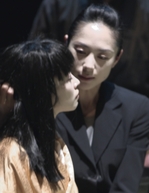SITE GUIDE
SEARCH
REVIEWS
REVIEW ARCHIVES
ADVERTISING AT CURTAINUP
FEATURES
NEWS
Etcetera and
Short Term Listings
LISTINGS
Broadway
Off-Broadway
NYC Restaurants
BOOKS and CDs
OTHER PLACES
Berkshires
London
California
New Jersey
DC
Philadelphia
Elsewhere
QUOTES
TKTS
PLAYWRIGHTS' ALBUMS
LETTERS TO EDITOR
FILM
LINKS
MISCELLANEOUS
Free Updates
Masthead
Writing for Us
A CurtainUp  London Review
London Review
 London Review
London ReviewAndromaque
|
I am trapped and beaten, and burned by more flames than once I lit.
— Pyrrhus
|

Camille Cayol as Andromaque and Xavier Boiffier as Oreste
(Photo: Keith Pattison) |
The plot focuses on the aftermath of the Trojan War and the now adult children of the participants who still suffer from their parents' ambivalent legacy of glory and bloodshed. To make their lives even more difficult, the characters are entangled in what is not so much a love triangle as a string sequence of unrequited love: Oreste (Xavier Boiffier) loves Hermione (Camille Japy) who loves Pyrrhus (Christophe Grégoire) who loves Andromaque (Camille Cayol) who will love none but her dead husband Hector.
Oreste is sent by the Greeks to claim the death of Andromaque's son Astyanax (Mathieu Spinosi) from his captor Pyrrhus. Although at first rebuffing the Greek request, Pyrrhus is hurt at Andromaque's continued refusal of his love and begins to see Astyanax's life as a pawn in his courtship. Meanwhile, Oreste uses this mission as an opportunity to see his beloved Hermione, who spurned his love when her hand was pledged to Pyrrhus. This convoluted nexus of hopeless and destructive loves inexorably progresses towards its hideous, tragic conclusion.
The production's main innovation is the role of Astyanax. Traditionally, the infant son of Hector never survives and is always depicted as being dashed from the walls of Troy at the end of the war. Racine, on the other hand, allows him to survive but keeps his presence in the play marginal and unspeaking. Racine's revisionist version of the Trojan war is taken by Donnellan as the key to the play's meaning: the theme of parents, children and inheritance. And so Astyanax is placed at the very centre of the action, always onstage and childishly impulsive but obedient to the adults.
Nick Ormerod's pared down set with harsh lighting and sounds which resemble a factory or institution, strips back the play and allows the characters act within a vacuum. There is little other than the vagaries of their emotions and the damage they cause. By restraining the design so tightly, the few effects which are used are all the more effective, such as the chilling sight of Pyrrhus' wedding confetti turning blood red.
The cast well represent Cheek by Jowl's usual style of sincerely portraying naturalistic but deep emotions. Xavier Boiffier's Oreste is a weak man and a desperate lover, while Christophe Grégoire's Pyrrhus is sympathetic as the formerly brutal warrior whose heroic exploits are seen by the woman he loves as the very cause of her grief. Camille Japy's Hermione, played very much as the daughter of the infamous Helen, is marionette-ish, brittle and upright, with a smile so broad and fixed her cheek muscles must ache. And finally, Camille Cayol's Andromaque is full of bereaved integrity, fiercely protecting what little she has left: her son and her dead husband's memory. As the protagonist who has suffered most, she also has the most stubbornness and her unerring purpose is ultimately rewarded.
Cheek by Jowl's strength is to make classic but often obscure plays lucidly clear. With fluid movement, unsurpassed acting and streamlined design, this Andromaque unlocks the play's meaning seemingly without effort. Rhetoric and verbal circumlocutions poorly hide the characters' selfish passions and motives, and beneath their facades of pride, lie frustrated ruinous loves.
|
Andromaque
Written by Racine Directed by Declan Donnellan Produced by C.I.C.T / Théàtre des Bouffes du Nord in a co-production with Théàtre du Nord, Lille and Cheek by Jowl With: Camille Cayol, Christophe Grégoire, Camille Japy, Xavier Boiffier, Romain Cottard, Bênêdicte Wenders, Cécile Leterme, Vincent de Bouard, Mathieu Spinosi Design: Nick Ormerod Lighting Design: Judith Greenwood Movement: Jane Gibson Music and Sound: Marc-Oliver Dupin Sound Design: Le Quatuor Beat Assistant Director: Michelangelo Marchese Costumes: Sylvie Martin-Hyszka Running time: Two hours and 30 minutes with one interval In French with English surtitles Box Office: 020 7638 8891 Booking to 2nd May 2009 at the Barbican Theatre and then booking 6th to 9th May 2009 at Warwick Arts Centre (box office: 024 7652 4524) Reviewed by Charlotte Loveridge based on 23rd April 2009 performance at The Barbican Theatre, Silk Street EC2Y 8DS (Tube: Barbican) |
|
REVIEW FEEDBACK Highlight one of the responses below and click "copy" or"CTRL+C"
Paste the highlighted text into the subject line (CTRL+ V): Feel free to add detailed comments in the body of the email and state if you'd like your comments published in our letters section. |
|
London Theatre Tickets Lion King Tickets Billy Elliot Tickets Mighty Boosh Tickets Mamma Mia Tickets We Will Rock You Tickets Theatre Tickets |




